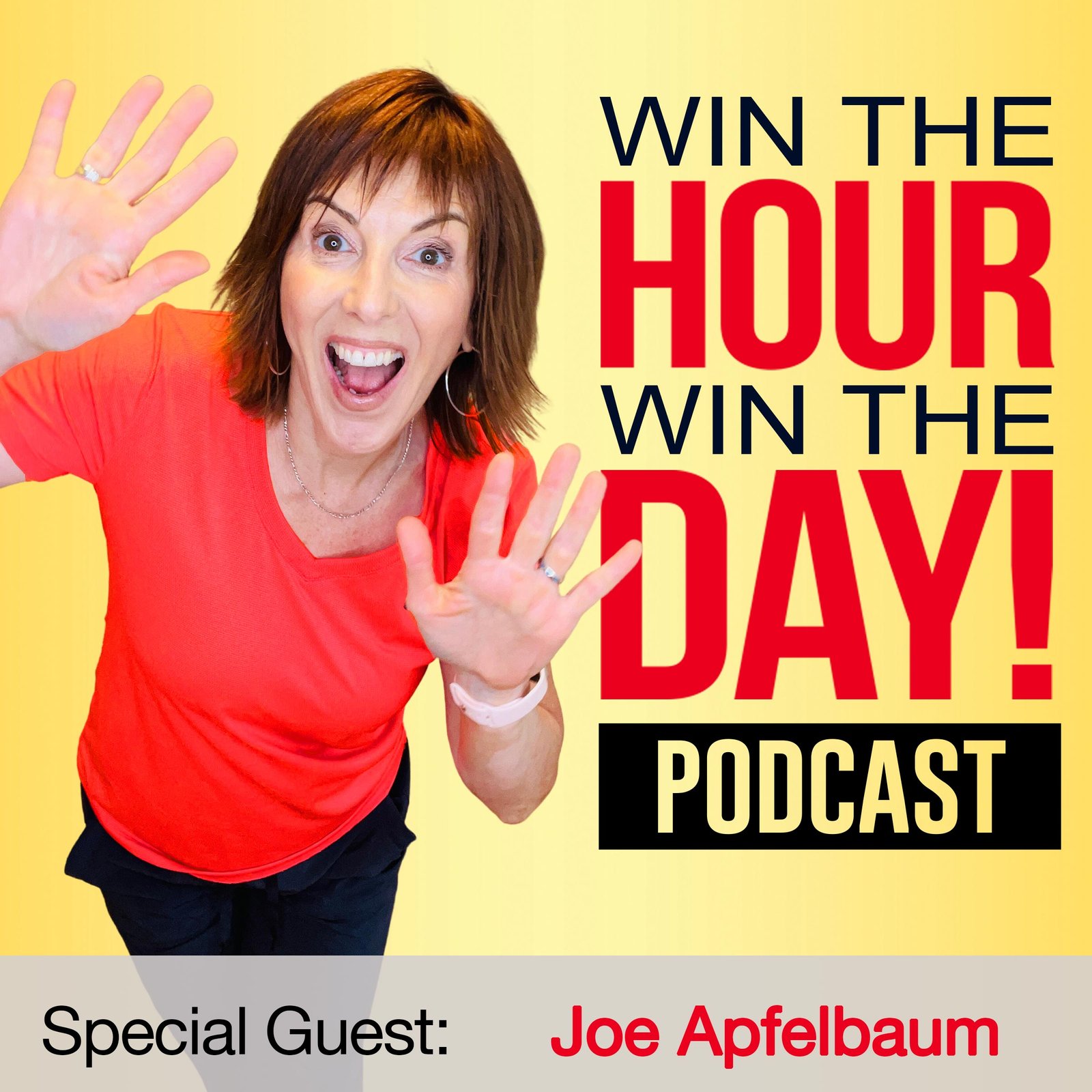Episode Summary This week’s episode of Win The Hour, Win The Day Podcast is...

Are You Ready For Your Next Big Win?
Know your entrepreneur personality and I’ll take it from there!
Recent Podcast Episodes
Preventing Burnout with Smart Work Tools! with Kris Ward
Episode Summary This week’s episode of Win The Hour, Win The Day Podcast is...
Master Social Selling: Heidi Medina’s Strategies for Engagement
Episode Summary This week’s episode of Win The Hour, Win The Day Podcast is...
Boost Productivity and Master Storytelling! with AmondaRose Igoe
Episode Summary This week’s episode of Win The Hour, Win The Day Podcast is...
Master Video Marketing: Top Tips for Entrepreneurs with Dan Bennett
Episode Summary This week’s episode of Win The Hour, Win The Day Podcast is...
Boost Your LinkedIn Strategy with AI Tools for Enhanced Productivity! with Joe Apfelbaum
Episode Summary This week’s episode of Win The Hour, Win The Day Podcast is...
Mastering Personal Branding with NLP Techniques! with Olesija Saue
Episode Summary This week’s episode of Win The Hour, Win The Day Podcast is...
Innovative Lead Generation and Email Automation Secrets with Jennie Wright
Episode Summary This week’s episode of Win The Hour, Win The Day Podcast is...
PR Strategies for Diverse Entrepreneurial Impact! with Jennifer Singh
Episode Summary This week’s episode of Win The Hour, Win The Day Podcast is...
Convert More Clients on LinkedIn with Richard Moore
Episode Summary This week’s episode of Win The Hour, Win The Day Podcast is...
Master Business Growth on Pinterest with Meagan Williamson
Episode Summary This week’s episode of Win The Hour, Win The Day Podcast is...
24/7 Sales Boost: Video Marketing Secrets with Alex Sheridan
Episode Summary This week’s episode of Win The Hour, Win The Day Podcast is...
Master Public Speaking Tips with Nausheen Chen!
Episode Summary This week’s episode of Win The Hour, Win The Day Podcast is...
Beating The Burnout With Connie Whitman’s Success Story
Episode Summary This week’s episode of Win The Hour, Win The Day Podcast interviews,...
Craft Your Social Media Content Strategy With Shannon McKinstrie
Episode Summary This week’s episode of Win The Hour, Win The Day Podcast is...
Boost Your Productivity with AI Tools: A Deep Dive with Erik Fisher
Episode Summary This week’s episode of Win The Hour, Win The Day Podcast is...
Boost Visibility: Repurpose Content and Leverage Podcasts With Christina Lenkowski
Episode Summary This week’s episode of Win The Hour, Win The Day Podcast is...
Master Personal Branding & Storytelling with Lisa McGuire
Episode Summary This week’s episode of Win The Hour, Win The Day Podcast is...
Boost Business on LinkedIn with Catherine B. Roy’s Strategies
Episode Summary This week’s episode of Win The Hour, Win The Day Podcast is...
Scale Your Business: Optimizing Virtual Assistant Services with Kris Ward & Rachel Eubanks
Episode Summary This week’s episode of Win The Hour, Win The Day Podcast is...
Affordable PR Mastery: Crystal Richard Unveils Modern Techniques
Episode Summary This week’s episode of Win The Hour, Win The Day Podcast is...
Mastering Business Storytelling with JJ Peterson’s Guide
Episode Summary This week’s episode of Win The Hour, Win The Day Podcast is...
Revamp Your About Page: Guide to Personal Branding
Episode Summary This week’s episode of Win The Hour, Win The Day Podcast is...
LinkedIn Mastery and Video Marketing Secrets with Alex Sheridan
Episode Summary This week’s episode of Win The Hour, Win The Day Podcast interviews,...
The Systems and Processes Playbook: Insider Secrets to Streamlining Your Small Business with Leah Abunales
Episode Summary This week’s episode of Win The Hour, Win The Day Podcast interviews,...
Have An Impact That You Never Thought! With Sherita Herring-Oglesby
Episode Summary
Sherita Herring-Oglesby will completely change how you see the world of business and nonprofits. Listen in as she explains what a non-profit can do for your business! Yes, YOUR business! No matter how small or young your business is, this is superpower that will surprise you!
Learn
-why every business should have a non profit!
-how nonprofits can grow your business and increase your impact
-how simple it is to set up and easy it is to maintain
Sherita Herring-Oglesby is a sought-after speaker, motivator, best-selling author, radio personality and business strategist. She possesses more than 25 years of community and economic development experience, has raised over $30 million for global projects, and served as a professional Economic Strategist for global leaders, city officials, chambers of commerce, and hundreds of businesses, nonprofits and community leaders, in more than 14 countries.
She has been honored and featured with some of the top renaissance women in the world, including First Lady Michelle Obama, the late Maya Angelou and Coretta Scott King, Congresswoman Maxine Waters, and renowned R&B Songstress Chaka Khan, just to name a few.
Join The Community: https://www.facebook.com/groups/WinTheHourWinTheDay/
Win The Hour, Win The Day! www.winthehourwintheday.com
Podcast: Win The Hour, Win The Day Podcast
Facebook: https://www.facebook.com/winthehourwintheday/
LinkedIn: https://www.linkedin.com/company/win-the-hour-win-the-day-podcast
You can find Sherita Herring-Oglesby at:
Website: https://www.philanthropyalliance.org
Twitter: https://twitter.com/SheritaHerring
Facebook: https://www.facebook.com/SheritaHerringMakingADifference
Check out the Outsourcing Playbook For Busy Entrepreneurs here: https://winthehourwintheday.com/outsourcing-playbook
Sherita Herring-Oglesby Podcast Transcription
[00:22:30] Kris Ward: Hey, everyone. Welcome to win the hour, win the day podcast. I am your host, Chris ward. It, I cannot tell you what a treat I have for you this week. I know I get excited about all my guests, because they’re just, I think I have amazing guests.
[00:22:51] And you guys tell me that too, but this one, this one, this is. This breaks some old, this is going to be something you never heard of and probably never understood how much power it would give you in your business. All right. We have Sharita herring Oglesbee and she is a very sought after speaker motivator.
[00:23:11] Bestselling author radio personality, and, Oh my goodness. Is she an amazing business strategist? It’s really going to be hard to contain all this stuff that she’s done. She has worked with Supreme athletes. She’s worked with top Renaissance people, including lady. Michelle Obama, first lady, Michelle Obama herself.
[00:23:32] Um, I don’t know. I said lady, but first lady Michelle, anyhow, Sharita. Let’s just dive in because as I stumbled through this, because I’m overexcited as I often get with people like you and I can’t wait for people to understand this whole world that you introduced me to you. So welcome to the show Sharita.
[00:23:49] Sherita Herring-Oglesby: Thank you. Thank you for having me. I’m really excited to be on, you know, Chris. Ever since the day, you and I met every time we’re looking at each other, we both are just smiles, right? Yes. Uh, but anyway, uh, so it’s an honor to be on. Now
[00:24:05] Kris Ward: Sharita is in a very small town. She’s got a beautiful rustic background.
[00:24:09] So if we lose her for a second or there’s any delay, it’s just the satellite trying to reach her and her little Nessel of the world that she lives in now. And yeah. So when you see her, um, when you look at the profile pictures of the graphics for the show, you’ll see, she has like 12 volt smiles. So she’s known for her.
[00:24:25] Andrea and her brightness, but here is another thing she’s really known for, and this is something so interesting. So street, I’m going to stumble through this and then you take the rain and tell me what this really means. So when I first met you, you explained about having a nonprofit for your business.
[00:24:41] Now, what I understood that to be was like, okay, I’m rich. I’m bill Gates. And I have too much money. And so what I need to do is hide some of it nonprofit, because I’ve got extra money and you said no, every time business should have a nonprofit. It really leverages the business and helps the business out.
[00:24:59] And this was like crazy to me. I didn’t understand it at all. So why don’t you take the rain there and just crack this nut open because boy, you guys have got to listen. Like, listen, if you’ve never listened to anything else I’ve done send to this. All right. Sharita and go girl.
[00:25:15] Sherita Herring-Oglesby: Well, the thing is a lot of times when people hear, Oh yeah, you should have a nonprofit.
[00:25:19] The first thing they think is, Oh, I should work for free. You know, because I obviously cannot make any money. And Chris, that is such a myth. Nonprofit does not mean you can’t make any money. First of all, nonprofit, when it was first established back over 123 years ago. It was established as an organization that can take over a lot of the stuff that the governor was doing, which was feeding the homeless or building housing or whatever.
[00:25:46] And so, because there are organizations that started addressing needs. See, those were just the highest needs at that time. But any organization that started addressing needs, they can be awarded a tax exempt. And so, but again, that doesn’t mean that you can’t get paid. That just means that you are a non-stock corporation. And that’s where non comes from nonprofit. You’re a non-stock corporation and the reason why you’re doing it business, their sole purpose is not to make money. It is to make a difference.
[00:26:18] Kris Ward: Right. So let me just jump, let me, let me jump in here, right? For a second. Cause I want to clarify right from the bat right off the bat, we’re not talking to our audience about switching into a nonprofit.
[00:26:30] We’re talking about it being an arm of their existing business. So I just want everyone to be clear. It’s not about okay. We’re w here’s what you do. You want to start a nonprofit? This is an arm of your existing business, correct?
[00:26:43] Sherita Herring-Oglesby: That is correct. And the thing is Chris, well, let me let, let me, let me use the better language instead of it being an arm that’s like you and me, your sister working together.
[00:26:51] So you’re not using hers. Security number and nonprofit separate entity, but you can have a profit and a nonprofit. And what I’m saying is like Chris, right now you have a for profit, but your pot can be under your nonprofit because you’re teaching you’re empowering. So what it does take the burden off of your, your nonprofit bottom line.
[00:27:16] Excuse me, bottom line. As far as expenses. And now that piece can be your nonprofit, but it’s still you doing it, but you’re getting paid with the grant. To run your, your podcast because you’re not doing it just to make a profit. You are teaching. You’re empowering. Now you probably hear Jack in the background.
[00:27:33] My Rooster’s just growing like crazy. Your problem, your problem here, machines and chickens and ducks, because it’s crazy what I didn’t realize. Now, this is totally off the subject. Even ducks and chickens are very personable and they’d like to be around people. So when, when my, when my, when my birds hear me talking, they tend to come around.
[00:27:54] Um, so, so yes, you can have that for profit and nonprofit and yes, you can need to be doing your podcast. Chris, you can be paid to be empowering individuals that are having to transition right now because of COVID-19. So through your podcast, your health, by bringing me on and other individuals pulling people another way to do business and even COVID-19 funding, you could be going after because you’re helping people transition.
[00:28:22] Kris Ward: Okay, so you meet, Oh, sorry. And here sometimes because she’s in this rustic thing. So when I sound like I’m being rude and interrupting on my end, it sounds like you’re done. I apologize. So two things you talked to me about also, so, you know, my book, you were like, Oh, you could be giving me when they are, when the day away as a teaching tool, people in different, whatever.
[00:28:41] So that could go under the nonprofit. So if I had a nonprofit, so I’ve got my profit, I’ve got my nonprofit. Does that mean, like, I always have to have, you know, secure grants for the nonprofit or the fact that I could put it through that. No, it’s not the right thing, not the arm of the business, but I guess in my mind, how I think of it as like I have a personal account and business account.
[00:29:01] So sometimes when I’m buying something at the store I have, Oh, I can claim that for my business. So I use that card. So if I have this nonprofit, it, my totally dependent on securing, uh, loans, or there are things that I can just sort of. Write that off as the cost in the nonprofit. Does that make sense?
[00:29:20] Sherita Herring-Oglesby: Well, the thing is, people always say, I don’t want to nonprofit cause they’re always begging for money. Okay. What business, what business doesn’t always have to ask for money. Right. But for some reason, when people think of it in the nonprofit arena, they call it begging. Right. But if you’re asking, you’re paying for your services or if you’re a grocery store and before they leave with those eggs and that milk, you’re asking them for their money.
[00:29:45] You’re not calling it begging. Right. So in the nonprofit arena, yes, you’re continuously going after funding, but you also can have fee for service. I teach. Workshops I speak and get an honorarium, you know, um, it is a business, so you can have fee for service, but what it allows you to do is go after those other investors, which are investors, grant, funders, and sponsors are investors.
[00:30:11] And it’s just ROI in the, for profit arena, return on investment. They’re looking at your business structure and seeing, okay. Whether after year after year two, year, three year, five year plan that they’re looking at, does it look like they’re going to get their money back plus some? So that’s the ROI, but in the nonprofit arena, the ROI is return on impact.
[00:30:33] They want to see by your plan. What kind of impact is their money going to have? And so they’re not looking to get money back. They’re looking to have an impact on lives that you touch.
[00:30:48] Kris Ward: For example, if I said, okay, I’ve got this book, we’re in this dynamic thing with the world. And I say, okay, helps entrepreneurs.
[00:30:54] So then I, in the nonprofits area, I’m going to give out whatever 500 books at cost with, you know, whatever. And that would go under the nonprofit thing. So then do I need to make sure I get a grant? Like, let’s say these 500 books cost me $500. Let’s keep the math simple, cause I’m really bad at math. So then do I need to get a grant to cover that?
[00:31:17] Even though it’s a really small fee compared to what the book would normally cost me. Okay. I need to get a grant to cover that, but then I can show that I’m helping new entrepreneurs and Lola laws. Is that how it goes?
[00:31:27] Sherita Herring-Oglesby: Absolutely. So like for instance, let’s say that you are awarding 50 scholarships to business owners that have lost their business or gotten laid off on furlough during COVID-19.
[00:31:43] And now you want to do a, a three week workshop on transitioning into a new career. Okay. Okay. And let’s say that that costs. A hundred dollars per person. So you’re writing a grant to cover that a hundred dollars for each one of those participants. So it can be gifted to them. So that a hundred dollars times 50 is $5,000.
[00:32:08] Right. Then also along with that, you want to give them, you want to give them your book and your book is $10 a book times 50. So that’s 500. So you’re going after a sponsorship or a grant for $5,500.
[00:32:25] Kris Ward: Which people do and their podcasts anyways, people often go out and say, okay, I need a sponsor for my podcast.
[00:32:30] I need a sponsor for my book. So you’re doing it. But now you’re, you know, you’re looking okay. Okay. Okay.
[00:32:36] Sherita Herring-Oglesby: That’s like with my ideal people, I’m just listening to you when we’re talking and Chris and I’m listening to you. That’s when I say, you know, there’s a grant for that. I’m not conjuring up some, there’s a grant.
[00:32:47] I’m listening to individuals and showing you how you’re missing that opportunity. So you’re a nonprofit. When you step into this arena should be right on the exact path you’re on is just there’s people that need you that because they can’t afford you. You’re missing that clientele, right? Where if you had nonprofit, now you can just reach in and grab them along and say, come right along with me.
[00:33:09] Let me help you do this. And see, it’s not that you’re working for free. You’re getting grants to cover you and your costs so that now you can give charity. Right. But people think charity is you being charity and doing everything for free. And that’s a misconception.
[00:33:26] Kris Ward: Right. Which is why I don’t work with new entrepreneurs because they can’t afford me.
[00:33:30] And so if they could afford me, you know, and I would want to get, I do want to get scholarships to youth and all this other stuff you gave an example once a day. Okay. Always remembered. And you talked about a plumber and you said, you know, this plumber was working and they had one part of their business.
[00:33:43] I’ll let you tell the story about inner cities and stuff. And it was a really good example. I’ll not butcher your story. You go
[00:33:48] Sherita Herring-Oglesby: ahead. Well, actually, he was in my class by default. I was teaching a class in Kansas city, Missouri, and one of the ladies that was attending her, they drove in from a smaller town, which was probably about two hours away.
[00:34:03] And so her husband, she asked, could he sit in the class instead of sitting out there in the truck? And I said, sure. So he’s sitting in my class, I’m talking, I’m telling you the stories about how you can get grants, how the nonprofit arena works and all of that. And so then I, I asked him, I said, tell me what you do.
[00:34:17] Oh, no, no, no. Ms. Hearing, I’m just sitting here. I’m just, I just drove my wife and I said, I know, but tell me what you do. And he says, well, I’m a plumber. He said, but right now, and matter of fact, it was during the time, uh, because I was in Kansas city from like 2009 to, uh, because my dad had passed away. So we’re in the middle of that down economy.
[00:34:38] Right. And he says, he says, ma’am. He said, well, I’m a plumber. He said, but right now, you know, I’m kind of wondering, because my, I don’t have any work. People can’t afford to get their plumbing fixed. And I said, even though it needs to be fixed. Right. And he said, right, And I said, you know, there’s a grant for that is that he could have his for-profit plumbing business.
[00:34:59] But on this side he had his nonprofit plumbing business and can totally do the exact same service for low income individuals, seniors, this stable single moms, it would buy all of his equipment. Oh, goodbye him, a whole another truck that works that side of the business. And now that’s his nonprofit and it becomes a job training pro service board plumbing.
[00:35:23] So he could be one of his regular employees to be that supervisor and training individuals that want to go into plumbing and helping them to go into their own business while giving plumbing services to individuals that are sitting with a plug. And what made me, let me think of that. Chris, I’ve been teaching in prison.
[00:35:41] And I was helping me in when they got out to go into other things, to keep them from going back into prison. And one of the guys that had gotten out, I went by to talk to him and his family. And when I walked in the house, Chris, you know how you walk in somewhere and it smells so bad. You don’t want to open your mouth, but screen time, I didn’t want to hurt their feelings.
[00:35:59] So I’m like, Hmm. You know what I mean? The, how it smelled horrible. Well, after I sat there and talking to them for a while, I guess I gotten used to the smell. And, but then before I left, I asked them, could I go to the bathroom? And they kind of looked at each other and as if, you know, and I’m thinking, wow, that’s kind of strange that one’s looking at the other.
[00:36:18] And then they say, yeah. And they had me going in the bathroom while I saw why, because their toilet was backed up and it was nasty. Right. And they had a big five gallon jug, I mean, bundles barrels. And, you know, I got like a painting of a five gallon bucket full of water. And what they would do is pour the water in after the toilet got so full for it, I guess, to go down.
[00:36:39] Right. That’s why the house was stinking. No Chris think about if they, and they had like a teen in the house that might be creatively people don’t look at the offshoot of all, of what, something that causes that team probably is teased about their house. Thinking. They’re probably thinking what their parents were living in the situation that they’re in, it’s causing a friction in the household.
[00:37:03] So there’s grants for improved communication, you know, low income families. I mean, there’s so much funding that, that this plumber could be impacting by helping these low income families. Yeah. And
[00:37:16] Kris Ward: you know, every entrepreneur I know, wants to help people, they want to give back. They’re re you know, I just, they’re just generous and ambitious and that’s the whole thing we want to make more money to give back.
[00:37:26] So I think what I’m hearing from you is not only can you, there’s off shoots where you can help these people, that you always had this ambition to help, and you thought, well, I have to be okay. Making all these millions, or I have to get to a point where I’ve got this excess of income, so you can help sooner than you planned on it.
[00:37:42] And then really, it sounds like another business growth strategy. That’s the exciting part. I just thought it was something meant for, you know, the Amazon J Jeff Bezos and the big boys at the table, but it’s a business growth strategy.
[00:37:56] Sherita Herring-Oglesby: That’s exactly what the profit arena just allows you to reach customers that you would not have been before.
[00:38:05] Yeah. You know, and what it does is Chris, it is so rewarding. It is so rewarding. Yeah, but there are some celebrities that are stepping away from what would have been paying them all of these years and totally just running their nonprofit. Chris, what is more rewarding? You teaching entrepreneurship to people that are already making money, are you teaching a room full of individuals that never even knew that they could be going into entrepreneurship now they’re making enough money and sustaining their business and their families?
[00:38:35] Which one would you feel better about it?
[00:38:37] Kris Ward: Yeah. Yeah, yeah.
[00:38:39] Sherita Herring-Oglesby: Yeah. It’s exciting. When we all are operating in what we love, and now I’m getting ready to take you to being a preacher’s child. We all were designed. We all came through the birth canal with a passion with somebody, and I’m not trying to step on anyone else’s toes, but God gave all of us passion for something.
[00:39:02] And you start operating in that. Chris, there’s absolutely no way that whatever you love can’t benefit someone else while it benefits you. And that’s why in this arena I teach with faith comes finance because when you trust, you are in your gut and Chris I’ve been doing this since 1988, started my business in 94.
[00:39:21] We developed over 600 organizations. I’m telling you, I coach a lot of people. And I watch this every day. I, and that’s why I love this arena so much because it allows me to help people to do just what they love. Just like how I’m sitting here on this 30 acres in a barn getting paid to do exactly what I love.
[00:39:39] There’s God or the universe or whatever you call it does not create anything just because. Like when the leaves drop and there’s, there’s microorganism, whatever you call them, he didn’t believe the girl. And then this is helping this to grow. What would make you think that whatever was put in you was just because no, there’s a reason.
[00:40:00] And when you start writing in that, and the wonderful thing is that in the nonprofit arena, you can do it. You can get paid to do it, and you will touch lies. And that’s what I specialize in doing. And it is unbelievable, not only the feeling that you will get from it, but the lives that you touch when never, ever go back to some of the negative behavior.
[00:40:22] Like when I was working with the guys in the prison, we reduce that recidivism rate by 75%. Because see, nobody wants to live in a cage. It’s just, they don’t know anything else to do this arena allowed guys getting fresh out of prison to see when you step into the nonprofit arena, whether you’re George Clooney, who also has a nonprofit who also received $150,000 grant for his satellite Sentinel project.
[00:40:46] It allows George Clooney, who already is right here in his arena to operate with someone that is just stepped out of prison. It might be here as far as at the bottom level, but when you have a nonprofit, it allows everyone to be on the same level. It doesn’t, it doesn’t matter your background. It doesn’t matter your title, your social economic status.
[00:41:06] You are able to start at the same level, your only limitation you. And that’s why my motto is, Oh, you are your only limitation. Yes, this arena allows you to do that. With, with no, with you’re unbridled is like a horseman is controlled for bridal those without a bridle in their mouth, it’s running and you’re riding bareback is so much more free.
[00:41:31] Kris Ward: Well, the bear Brock would be a short ride for me, but I’ll take your word on it, you know? And it does, it lights you up. I mean, you feel that when you, when we all do this and you get excited and when I,
[00:41:43] Sherita Herring-Oglesby: I gotta show you something,
[00:41:44] Kris Ward: can you, now it’s a podcast people. Oh, there’s a rooster. Okay. I have to do we’re on video when we meet, but they don’t get to see all this, but there is roosters gathered around her and you know what I’ve known her for quite a while now, and this is the life she wanted.
[00:41:57] Now. She has an insane due to all this work. So. You know, I always say to people, I want to be part of your success story. Nothing lights me up more when you see people evolve and grow in their business. And when we’re helping them grow their team and create their win team. And that’s amazing, but you’re right.
[00:42:12] Could I help more people if I could reach more people with no, lighten me up even more like we all have these. Things that are inside us, that we just want to give and give and give. So if this is the opportunity to have a really effective business strategy and to make a bigger impact, packed on more people, you know, I feel like we’ve been to business church.
[00:42:29] Like Sharita has some, like, this is, and I, and I’ll tell ya, it’s so great to have you on the show because. You’re a very patient individual, because we’ve been through this, you and I, a couple of times, and then you had all convinced and then you’ve, then I go away for a bit and I get overwhelmed with, okay, what do I have to do?
[00:42:45] I have to fill these forms. It seems overwhelming, but you have explained it to me the last time we are going to do this. And that’s the thing is I think we all just get overwhelmed with, it seems. W we just, all the stories we hear of people doing this, you, we only hear about the big charities and the big organizations.
[00:43:02] So it seems so out of reach for us. But when you tell that plumber story, that makes such a difference, right? It helped grow his
[00:43:08] business.
[00:43:10] Sherita Herring-Oglesby: Chris, even your photography, you could even have an online photography program operating right now, something to do telling the interesting story about how you let’s say that it’s for ages 13 to 18, and they’re taking pictures about how COVID-19 is impacting their life.
[00:43:27] How are they feeling right now, homeschooling or whatever. And then on every other Saturday you’re on with them and they’re showing their pictures. And they’re telling their story. What else is that doing? That’s helping combat loneliness and depression. That a lot of times that this young group is starting to experience a lot of them were overeating.
[00:43:44] And so it’s helping to combat obesity. What I’m saying to you is we’re talking about photography, but look at the other grants you could be going after.
[00:43:52] Kris Ward: Yes. Now people treat us know me for a really long time with my branding company. Before that there was a big component photography. I haven’t done it in a very long time.
[00:44:00] Now we’re all about marketing and creating a win team, but that was a neat area. Infant. Yeah, I haven’t, I
[00:44:06] Sherita Herring-Oglesby: haven’t good.
[00:44:08] Kris Ward: Well, I have had my own photographer. We’re about 10, 12 years. So he does the clients I’m there in the set. And then the branding evolved into the marketing, like a good 10 years ago. So, you know, we do still do shoot sometimes as part of the marketing campaign, but, and done it in a very long time.
[00:44:24] So it’s part of our package if you’re working with marketing with us. But yeah, so that’s what she’s referring to. We’ve we’ve gone back quite some way, Sharita and I,
[00:44:32] Sherita Herring-Oglesby: so, but.
[00:44:34] Kris Ward: But the point is still a great one is no matter what you do, you have the ability to impact other audiences and to be able to afford to do that.
[00:44:44] Sherita Herring-Oglesby: Absolutely. Chris, because think of how many new entrepreneurs and small business owners need headshots, think of how many of them need, um, for those that do video and editing. Those businesses need that for sizzle reels about their business. If they had it under their own profit, now they could be getting grants to do that.
[00:45:03] Yeah. Offering that service at a discounted rate for some of them, it could be free because that organization has gotten funding to cover their costs. And that piece could even still be a job training program that could be teaching, editing, you know, uh, um, um, Photoshop, Chris now. Is it possible for me to show my screen as we’re doing this?
[00:45:26] Kris Ward: Well, cause most people are gonna hear this audio. So we can’t do that right now. But what I would also say too, cause cause this is on iTunes. What I would also say is the first question most people have because you’re always looking to disqualify yourself like, Oh, this won’t work for me is I’m from Canada and you deal with people all around the world.
[00:45:43] So that’s another thing I want you to dress. This is just not a us thing. So, what I would say to you is, you know, explain that to us. There’s you deal with people like in the biggest and the smallest countries around the globe?
[00:45:55] Sherita Herring-Oglesby: Absolutely. We’ll see, we’ve developed our organizations in Pakistan, China, Russia, Cambodia, um, more than more than 16 countries and some of them, multiple organizations in those countries.
[00:46:09] And now one of the things is that the reason why most, any organization that I have developed. We actually, um, develop their home base out of the United States. Now, even if they don’t have an actual. Uh, individual organizations that can serve as what’s called their, their, uh, agent for service. A lot of times my company will operate as the agent for service so that they can, we have a us based organization that can steal no projects.
[00:46:38] Now, Chris, my reasoning for that. Is the United States is one of the most established entity as far as countries for the nonprofit arena, the nonprofit arena, the third largest business sector in the United States. And that’s why I was asking you, I show my screen. So you, most people aren’t aware of that.
[00:46:57] Even other industries that employ more people. Bending in the nonprofit arena is manufacturing, which employees, retail, retail, employees, about 16 million people. And then manufactured employees 12 like 12.3. And then right up under that is the nonprofit arena. Employing 11.8. But economists talk about that.
[00:47:25] The thing is Chris, I’m not telling people to give up their for profit and have only a nonprofit, right? What makes this work so well in the United States is because all of the entities are needed in order to be the superpower that we are. And that’s why the sensei Fox, who was the former president of Mexico, brought me there to train him and the first lady and their staff and even local nonprofits.
[00:47:49] And major business owners because they want to duplicate the nonprofit sector that operates so well in the United States that he’s getting closer. I’m sorry.
[00:47:59] Kris Ward: You know? No, that’s okay. It’s nature at its best. You are where you want to be. You’re living the life on a barn and you’ve got a very enthusiastic roommate, the rooster.
[00:48:07] So
[00:48:07] Sherita Herring-Oglesby: listen,
[00:48:08] Kris Ward: it’s not like somebody’s honking at you cause you’re in the way. We’re good. We’re
[00:48:11] Sherita Herring-Oglesby: good. Yeah. She read it,
[00:48:13] Kris Ward: tell us, you know what, we could just can’t get enough from you. My gosh, this could be like a six part series. So hopefully people have got a glimpse. I know I’ve had to hear at a time and time again, cause I’d be like, Oh my gosh, it’s just so much simpler.
[00:48:25] You put these roadblocks up, right. You can. Okay. Then I need a board. And that sounds very, I don’t know, movie of the week-ish and there’s a takeover the board and you’re like, no, you need three people. That’s it. So it’s really, it’s just a simple thing and it’s, again, a way to empower and grow your business and then light you up and be able to help more people and do it in a way that benefits you and them.
[00:48:46] It really is. We love this a win, win situation.
[00:48:51] Kris Ward: So where can people go to you? Where can they find you? Your enthusiasm, your bright smile, where can they get more
[00:48:55] Sherita Herring-Oglesby: info? Well on Facebook, they can, they can go to pairing making a difference and a hearing the difference. Yeah. And then my, my site is philanthropy alliance.org.
[00:49:09] Okay. I have to be aligned and we send out free grant information regularly. So if they’d like to start getting that information and also information about my business tips and classes coming up and all of that, they can go to my website and there’s a tab that says, sign me up and that’s where they can just sign up and get on the database to start receiving the regular information.
[00:49:31] Chris, do I have time just to say something about the board,
[00:49:34] Kris Ward: you go ahead. I’ve got time for you.
[00:49:37] Sherita Herring-Oglesby: Okay. So a lot of times people are so afraid of the board of directors, but I’ve seen more come. It happens more often in the, for profit arena than the nonprofit arena were. Executives are fired by them.
[00:49:53] And again, in the for-profit arena, most of the board members are when you are your, your investors, they might be your investors, maybe shareholders, and they’re watching you to make sure that you doing what it takes to make sure that company makes money. So they get their money back. Right. And if you’re not doing that great job, they will fire you.
[00:50:15] And bring on someone else when the nonprofit arena yeah. Not happen. That way. Board members can money back from the organization. That’s not the reason for them serving on the board. There cannot be any financial conflicts of interests. Okay,
[00:50:34] look, that’s, that’s one of the younger roots. There’s this just learning how to Crow. So though I’ve been in this arena since 1988, Chris, I’ve only seen two organizations. They got rid of their executive directors under the nonprofit and that’s because they were found they were embezzling money.
[00:50:51] Kris Ward: Oh, okay.
[00:50:53] Sherita Herring-Oglesby: Is, is let go in the nonprofit arena, usually a legal reason why, and that’d be money related that they’re trying to bring someone else. He had to make more money. It. And so that’s why it happens more often in the, for profit arena than the nonprofit arena.
[00:51:10] Kris Ward: Really important clarification. I’m glad we made time for that.
[00:51:13] So again, cause you see all these dramatic things we all heard about the Steve jobs things and you get these things confused. So I think the problem is there’s so much misinformation out there and of course you don’t know what you don’t know. So then you think, Oh blah, here’s the, here’s the reasons why that won’t work for me.
[00:51:27] So mental note, any huge illegal activity like embezzling will cause you problems. Write that down, everybody, your pull over if you’re driving.
[00:51:36] Sherita Herring-Oglesby: So, the board of directors is very different. So again, it’s just the, this is just a, a beautiful path to explore. Oh, yes. Yes. And what most people don’t want aware of?
[00:51:49] See the PGA, the professional golf association is a nonprofit, the national hockey league nonprofit. Um, the NFL up until 2015 had been a nonprofit since its inception. Now the individuals and the individual teams under the leagues are not nonprofit, but the leagues. And there’s a reason Chris, think about the NFL.
[00:52:12] When they hold one game, look at how many jobs it creates, right? And because having a nonprofit status, they’re not taxed this heavy for creating all those jobs. We’re talking about. Not only the people that work in the concession stand, but even the people that make the straws, the cuffs, the rappers that they wrap burgers in the thing that holds the hot dogs, the insurance, uh, those that are throwing you, your peanuts at the games, all of those jobs are being created.
[00:52:38] Right. And by them having particular tax exempt status, it gives them a little bit of a tax break. It’s almost just like you hear about subsidies or you hear about taxes. I think about ways of grants that larger businesses get a break. Right. It’s just, when you’re a smaller company, they call them grants.
[00:52:57] But like right now with what’s going on with COVID-19 and, and States are being awarded dollars, that then it goes down to the city level and then it’s divvied out to individuals to get that $600 a month or whatever that they’ve gotten through. COVID-19 you guys that’s nothing but a grant. They just call it stimulus.
[00:53:15] And I explained that non the nonprofit arena and grant step up more in times like this than even any other time.
[00:53:23] Kris Ward: Gotcha. Okay, man, I’m telling you. Alright, I don’t have time to talk to you. I got to start filling up, get this grant thing going. We gotta wrap this up. I got work to do boy. Oh boy. It’s just, you know, having you by now, you’ve got her passion and literally I have run into hundreds and hundreds of people that she’s helped in love.
[00:53:44] She’s changing, not just, not the off-put of like the, all the people that plumber help, but the people like the plumber. So yeah. Yeah, check it out, follow her on Facebook, reach out, learn more because it just sounds like an a, you know, not sounds like it. I know it is. It’s an amazing opportunity to help more people in less time and really just another really effective strategy for your business.
[00:54:07] That’s it. Thank you, Sharita. We can’t. Thank you enough. Thank you. And please thank all the roosters who showed up and just didn’t tire of contributing to this show. Other people would get tired halfway through, but no, they kept it up. So we want to thank each and every one of them
[00:54:25] Sherita Herring-Oglesby: crazy because they’re actually standing here and they’re like bending their heads, looking fun to see me around.
[00:54:30] Kris Ward: What are you doing? All right until next time, everyone. This is when the hour, when the day Chris ward. Thank you.





























